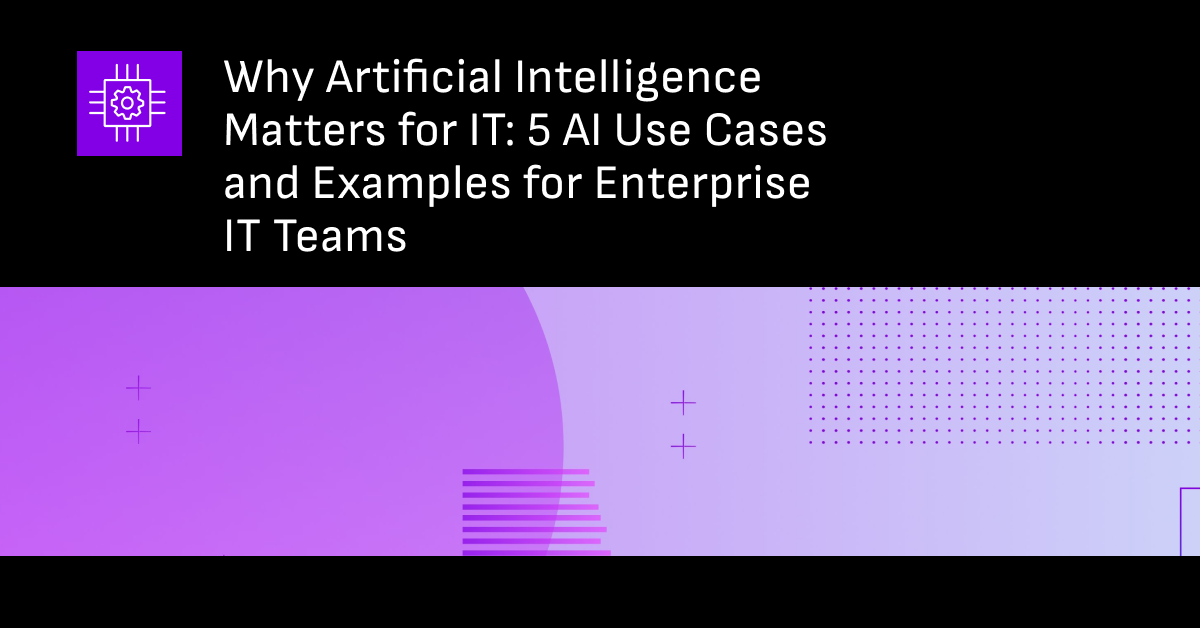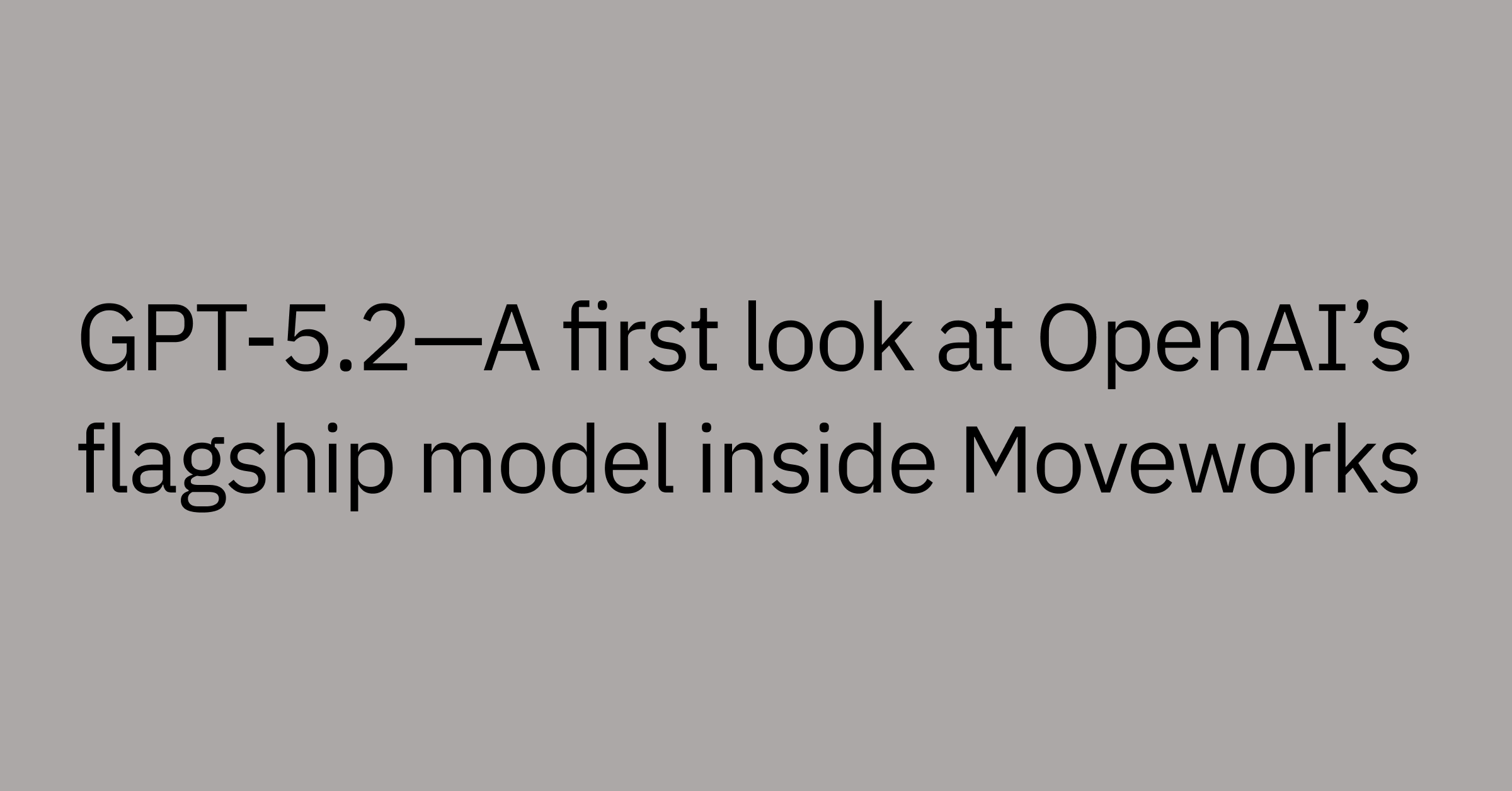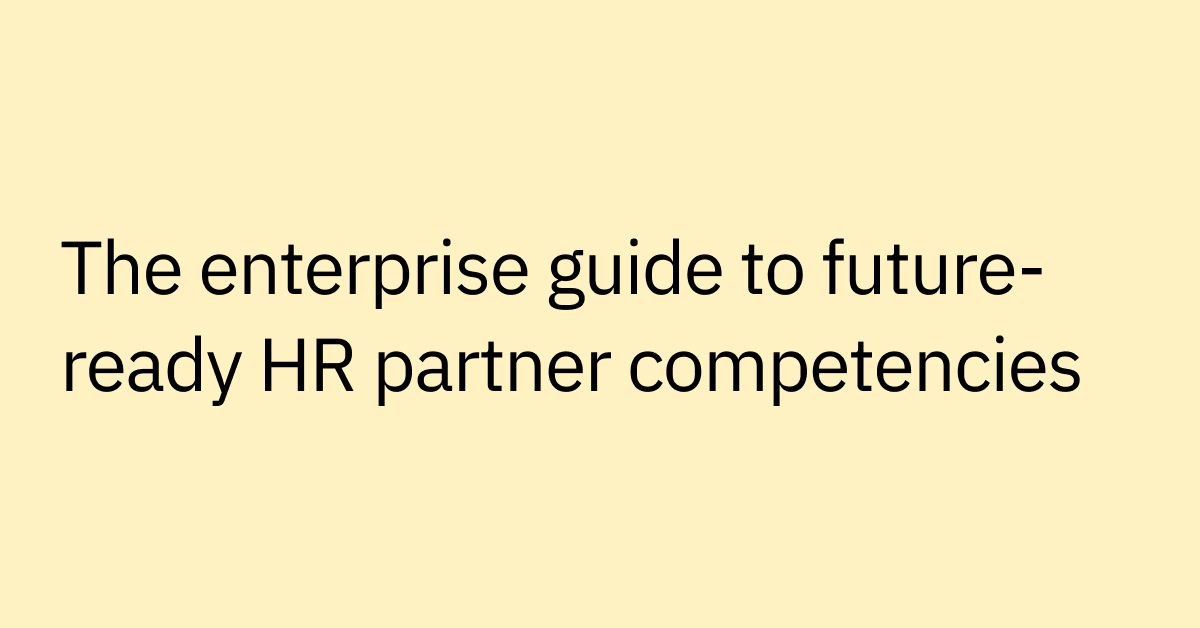Table of contents
Modern IT environments are more complex than ever. Salesforce research shows that organizations now use over 1,000 apps on average, and add things to the mix like hybrid clouds and aging legacy systems, and it’s easy for enterprise IT teams to find themselves dealing with a complicated web of tools that don’t always play nicely together.
These complex environments often mean that IT teams are constantly trying to balance keeping up with tedious, repetitive tasks just to keep things running smoothly with their need for forward-looking measures and innovation.
We’ll explain five ways businesses can leverage AI for IT to empower employees while transforming enterprise IT operations for the better.
What do we mean by AI and ‘advanced’ AI?
AI typically refers to systems capable of performing specific, narrow tasks with a predefined set of rules and parameters, such as chatbots or monitoring network performance, utilizing fixed algorithms within a defined scope.
Advanced AI, which includes machine learning (ML) and agentic AI, can analyze vast amounts of IT data to identify patterns, predict issues before they occur, and dynamically allocate resources, thereby adding layers of intelligence and adaptability to IT operations.
Agentic AI, which means AI that can ‘take action’ extends this a step further. It is able to autonomously manage certain tasks and workflows within complex IT environments, make real-time decisions to optimize workflows, help manage incidents, and improve overall system resilience without constant intervention.
1. Optimize incident management
Your IT team probably spends hours every day dealing with a nonstop flow of support tickets. With so many coming in, it can be tough to prioritize, and triaging them manually takes up time that could be used for more important, strategic work.
AI-powered automation can help change the ticketing process, creating faster resolutions for employees and lighter workloads for your team.
Find and assess tickets with ease
Without AI and automation, your support team has to manually dig through tickets, trouble shoot repetitive issues, and decide what to do next and who needs to be involved. It's not a stretch to say that this process is often time-consuming, inconsistent, and can be prone to mistakes.
AI-powered systems are able to immediately scan incoming tickets, using natural language processing (NLP) to understand their content and provide relevant information to the team.
This enables support staff to quickly locate specific tickets and assess needs without navigating through complex systems, which can be challenging if team members have varying levels of experience.
For instance, if an employee submits a ticket saying, "Excel crashes when opening large files," an AI-powered support tool is able to automatically recognize it as a software performance issue and suggest solutions based on past incidents, such as recommending an increase in the computer's memory.
Improve ticket routing and escalation
Misrouted tickets may significantly delay resolution times. When a request lands with the wrong team or person, employees wait longer and satisfaction creeps down.
AI tools are able to help send tickets to the right specialists by considering things like ticket content, urgency, and team workloads.
AI can help automatically escalate tickets based on predefined criteria or emerging patterns. If multiple employees report similar network connectivity issues within minutes, the system’s algorithm can flag this as a potential outage requiring immediate attention.
Automate ticket management
With predefined workflows and machine learning models, some AI assistants are able to handle everyday tasks like password resets, software installs, or access requests automatically. Users get instant solutions — often in seconds instead of hours or days — enabling your support team to focus on tackling the bigger, more complex issues and projects.
Online marketplace Mercari US saw 74% of their IT tickets resolved autonomously by leveraging AI for additional IT support. The company's employees were so impressed with the solution that 94% now reach out to the AI assistant first when they have questions.
2. Resource allocation and workload distribution
With technology evolving so quickly and systems becoming more connected, your team might find it tough to manage workloads and share resources efficiently.
The variability in application requirements often strains staff, requiring advanced skills and proactive management to prevent disruptions. AI helps address these challenges by optimizing resource allocation and streamlining processes.
Streamline device provisioning
Device provisioning is necessary, but time-consuming. From hardware selection and software installation to configuration and deployment, each step requires careful attention to detail.
AI can help make this process easier with self-service provisioning. Employees are able to simply request new devices through an advanced agentic AI assistant that checks eligibility, confirms inventory, kicks off approval workflows, and tracks everything from start to finish.
This automation saves your team valuable time while creating a better customer experience for employees who receive their management-approved equipment faster and with fewer complications.
Simplify software asset management
Managing software assets can be tricky with factors like complex licensing agreements, growing inventories, compliance rules, and security issues. Relying on manual tracking often means missed renewals, unused licenses, and potential compliance headaches.
AI can help simplify asset management by monitoring licensing data, usage patterns, and compliance requirements. It automatically checks for upcoming renewals, assesses costs, monitors usage to optimize allocation, and flags potential compliance issues before they escalate.
By using AI for asset management, you are able to reduce costs, strengthen security, and maintain compliance while minimizing the manual effort required from your team.
3. Supercharge project management
IT projects typically involve multiple stakeholders, complex timelines, and numerous interdependencies. To manage workloads effectively, your team should strive for on-demand access to updated information and accurate project tracking.
AI can help by creating an up-to-date single source of truth. This allows teams to stay on track without interrupting their workflow to request new access or search for information.
AI can help individual team members stay on top of assigned tasks by:
- Providing real-time updates on project status
- Sending smart reminders about approaching deadlines
- Reporting on time spent on specific tasks to improve future planning
Even better? When you use an advanced AI assistant that integrates with your existing tools, you can do this directly through the apps your employees already use, like Slack or Microsoft Teams.
This integration makes communication smoother and boosts efficiency, helping team members stay on top of their tasks and keep things organized without being bogged down by administrative tasks in project management systems like Jira and Asana.
4. Enhance employee support
It’s tough to provide timely support to employees when your IT team members are already maxed out. AI helps evolve employee support by handling common questions and requests automatically, supporting more self-sufficient employees and giving IT teams more time to innovate.
Empower employee self-service
AI assistants and chatbots can serve as the first line of defense for employee support, providing immediate assistance for a wide range of issues.
Rather than submitting a ticket and waiting for a response, employees can interact with an AI assistant that understands common, everyday language, walks users through troubleshooting steps, helps find the right resources, and provides personalized guidance based on the employee's role.
By leveraging AI, employees are able to receive immediate, context-aware support, bypassing delays and enhancing their ability to resolve issues more efficiently and enhancing their overall experience.
Automate password resets
Password resets are among the most common IT support requests, yet they require virtually no creative problem-solving from your team.
That makes them the ideal candidate for automation!
Advanced AI assistants are able to securely handle password and multi-factor authentication resets by verifying the user's identity, executing the reset according to company security policies, providing clear instructions, and confirming successful completion.
Automated password resets take a load off your team and give employees quick access to their accounts without extended downtime, so they’re not stuck locked out of important systems longer than necessary.
Send reminders about software updates
Outdated software creates security vulnerabilities and causes system instability. However, many employees postpone updates because they can take a while and lead to downtime that their busy schedules can’t afford.
(Truth time: We’ve all hit “remind me later” on those software update notifications.)
AI makes it easier to stay on top of updates by keeping an eye on systems, sending friendly reminders, giving clear instructions, and even offering to schedule updates outside of work hours. It can also nudge employees to follow best practices, like clearing out unused files to keep IT systems running smoothly.
These automated reminders keep your system secure and running smoothly without needing your IT staff to constantly monitor it.
5. Automate code review
Your dev teams are expected to code faster while catching bugs at every stage of software development. But constantly switching between testing and fixing bugs takes up time that could be better spent on projects that align with broader company goals.
Advanced AI is able to automate the code review process by analyzing code and datasets for potential issues, bugs, and adherence to coding standards. It provides detailed feedback and suggestions for improvement, helping engineers to create high-quality code and reduce manual review time.
This lets your development teams focus more on higher-level action items and meet critical deadlines, rather than getting stuck in a cycle of repetitive code checking.
Agentic AI assistants: A leading AI solution for enterprise IT
While there are many ways to implement AI in IT operations, agentic AI assistants have emerged as one of the most versatile and effective solutions for enterprise environments.
Some more basic AI assistants wait for instructions and handle one task at a time. Agentic AI assistants like Moveworks AI Assistant are able to plan ahead, make decisions, and complete multiple steps towards a goal.
For example, in a multi-departmental approval process, an AI agent can help autonomously manage the entire workflow, engage relevant stakeholders for approvals, and update systems seamlessly in real time.
It can also help troubleshoot technical issues, automate workflows, and even handle real-world, cross-functional tasks.
What can this do?
Resolution times can shrink from days to hours or minutes, increased user satisfaction, and not to mention a lighter burden on your support team too.
Supercharge your enterprise systems with AI agents. Get your AI agent roadmap today.
Moveworks Agentic AI Assistant can transform your IT operations
As your IT team faces pressure to do more with less, AI for IT offers a path forward. AI assistants, particularly advanced assistants with agentic functionality, can help relieve the burden: automating routine tasks, streamlining complex workflows, and putting the power in employees' hands with effective self-service options.
While regular AI assistants wait for instructions and handle one task at a time, an advanced agentic AI assistant like Moveworks AI Assistant is able to plan ahead, make decisions, and complete multiple steps on its own to achieve a goal.
Agentic AI assistants let users chat with them in everyday language, giving them a single interface to find answers and take action – whether they're requesting a password reset, reporting a broken printer, or trying to access a new software tool.
What’s more, with Moveworks AI Assistant and our AI Agent Builder, IT teams have the flexibility they need to build custom automations that easily integrate with existing workflows, providing an out-of-the-box solution.
This combination of flexibility and intelligence means IT teams don’t have to choose between fast time-to-value and deep customization — they are able to get both.
See how AI can transform your IT operations: Get started with Moveworks today.



